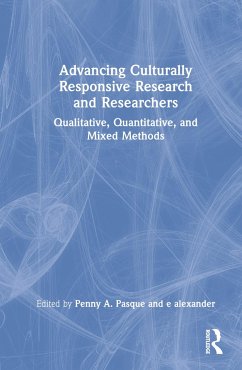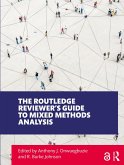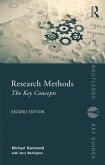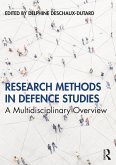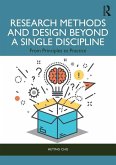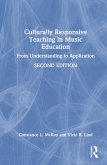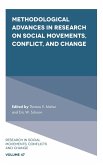Advancing Culturally Responsive Research and Researchers
Qualitative, Quantitative, and Mixed Methods
Herausgeber: Pasque, Penny A.; Alexander, E.
Advancing Culturally Responsive Research and Researchers
Qualitative, Quantitative, and Mixed Methods
Herausgeber: Pasque, Penny A.; Alexander, E.
- Gebundenes Buch
- Merkliste
- Auf die Merkliste
- Bewerten Bewerten
- Teilen
- Produkt teilen
- Produkterinnerung
- Produkterinnerung
Advancing Culturally Responsive Research and Researchers: Qualitative, Quantitative and Mixed Methods encourages readers to design and engage in methodologies and methods that place cultural relevancy at the center of inquiry.
Andere Kunden interessierten sich auch für
![Advancing Grounded Theory with Mixed Methods Advancing Grounded Theory with Mixed Methods]() Elizabeth G. CreamerAdvancing Grounded Theory with Mixed Methods42,99 €
Elizabeth G. CreamerAdvancing Grounded Theory with Mixed Methods42,99 €![The Routledge Reviewer's Guide to Mixed Methods Analysis The Routledge Reviewer's Guide to Mixed Methods Analysis]() The Routledge Reviewer's Guide to Mixed Methods Analysis67,99 €
The Routledge Reviewer's Guide to Mixed Methods Analysis67,99 €![Research Methods Research Methods]() Michael HammondResearch Methods21,99 €
Michael HammondResearch Methods21,99 €![Research Methods in Defence Studies Research Methods in Defence Studies]() Research Methods in Defence Studies39,99 €
Research Methods in Defence Studies39,99 €![Research Methods and Design Beyond a Single Discipline Research Methods and Design Beyond a Single Discipline]() Heting ChuResearch Methods and Design Beyond a Single Discipline86,99 €
Heting ChuResearch Methods and Design Beyond a Single Discipline86,99 €![Culturally Responsive Teaching in Music Education Culturally Responsive Teaching in Music Education]() Constance L. McKoyCulturally Responsive Teaching in Music Education176,99 €
Constance L. McKoyCulturally Responsive Teaching in Music Education176,99 €![Methodological Advances in Research on Social Movements, Conflict, and Change Methodological Advances in Research on Social Movements, Conflict, and Change]() Methodological Advances in Research on Social Movements, Conflict, and Change168,99 €
Methodological Advances in Research on Social Movements, Conflict, and Change168,99 €-
-
-
Advancing Culturally Responsive Research and Researchers: Qualitative, Quantitative and Mixed Methods encourages readers to design and engage in methodologies and methods that place cultural relevancy at the center of inquiry.
Hinweis: Dieser Artikel kann nur an eine deutsche Lieferadresse ausgeliefert werden.
Hinweis: Dieser Artikel kann nur an eine deutsche Lieferadresse ausgeliefert werden.
Produktdetails
- Produktdetails
- Verlag: Taylor & Francis Ltd
- Seitenzahl: 276
- Erscheinungstermin: 19. August 2022
- Englisch
- Abmessung: 240mm x 161mm x 19mm
- Gewicht: 526g
- ISBN-13: 9780367648596
- ISBN-10: 0367648598
- Artikelnr.: 64035502
- Herstellerkennzeichnung
- Libri GmbH
- Europaallee 1
- 36244 Bad Hersfeld
- gpsr@libri.de
- Verlag: Taylor & Francis Ltd
- Seitenzahl: 276
- Erscheinungstermin: 19. August 2022
- Englisch
- Abmessung: 240mm x 161mm x 19mm
- Gewicht: 526g
- ISBN-13: 9780367648596
- ISBN-10: 0367648598
- Artikelnr.: 64035502
- Herstellerkennzeichnung
- Libri GmbH
- Europaallee 1
- 36244 Bad Hersfeld
- gpsr@libri.de
Penny A. Pasque is a Professor in Educational Studies, Director of Qualitative Methods and Director of the QualLab in the Office of Research, Innovation and Collaboration (ORIC) in College of Education and Human Ecology at The Ohio State University. She is editor of the Review of Higher Education (with Nelson Laird). e alexander is an Assistant Professor at the University of Kansas, and qualitative-leaning mixed methodologist who enjoys learning with others about tailoring research to be grounded in community and place.
1. Introduction: The Importance of Culturally Responsive Research and
Culturally Responsive Researchers. Section I: Contexts and Considerations
for Quantitative, Qualitative, and Mixed Methods Research. 2. The
Transformative Paradigm: An Evolving Journey in Methods and Social Justice
Aims. 3. Culturally Responsive Post-Qualitative Research. 4. Must an
Education in Research Ethics Engage Issues of Culture, Context, and
Community?. Section II: Qualitative Innovations. 5. Teaching and Engaging
Autoethnogaphy as Qualitative Engagement. 6. Critical, De/colonial, and
Contemplative Approaches to Qualitative Inquiry. 7. Intersectionality as a
Lens in Qualitative Research: Possibilities, Problems, and Practices. 8.
good kid, m.A.A.d research: Culturally Sustaining Research and Calling Out
the White Gaze in Our Epistemologies. Section III: Quantitative and Mixed
Methods Innovations. 9. Using Counterfactual Modeling and Machine Learning
Generated Propensity Scores to Examine Black Social Control and
Mathematics. 10. Examining Discipline from an Intersectional Lens. 11.
Detecting Differential Effects Using Regression Mixture Models:
Applications Using Mplus. 12. The Utility of Critical Race Mixed
Methodology: An Explanatory Sequential Example. 13. Advancing Critical Race
Spatial Analysis: Implications for the use of GIS in Educational Research.
Section IV: The Future of Culturally Responsive Research. 14. The Future:
Advancing Innovations of Culturally Sustaining Research and Researchers.
Culturally Responsive Researchers. Section I: Contexts and Considerations
for Quantitative, Qualitative, and Mixed Methods Research. 2. The
Transformative Paradigm: An Evolving Journey in Methods and Social Justice
Aims. 3. Culturally Responsive Post-Qualitative Research. 4. Must an
Education in Research Ethics Engage Issues of Culture, Context, and
Community?. Section II: Qualitative Innovations. 5. Teaching and Engaging
Autoethnogaphy as Qualitative Engagement. 6. Critical, De/colonial, and
Contemplative Approaches to Qualitative Inquiry. 7. Intersectionality as a
Lens in Qualitative Research: Possibilities, Problems, and Practices. 8.
good kid, m.A.A.d research: Culturally Sustaining Research and Calling Out
the White Gaze in Our Epistemologies. Section III: Quantitative and Mixed
Methods Innovations. 9. Using Counterfactual Modeling and Machine Learning
Generated Propensity Scores to Examine Black Social Control and
Mathematics. 10. Examining Discipline from an Intersectional Lens. 11.
Detecting Differential Effects Using Regression Mixture Models:
Applications Using Mplus. 12. The Utility of Critical Race Mixed
Methodology: An Explanatory Sequential Example. 13. Advancing Critical Race
Spatial Analysis: Implications for the use of GIS in Educational Research.
Section IV: The Future of Culturally Responsive Research. 14. The Future:
Advancing Innovations of Culturally Sustaining Research and Researchers.
1. Introduction: The Importance of Culturally Responsive Research and
Culturally Responsive Researchers. Section I: Contexts and Considerations
for Quantitative, Qualitative, and Mixed Methods Research. 2. The
Transformative Paradigm: An Evolving Journey in Methods and Social Justice
Aims. 3. Culturally Responsive Post-Qualitative Research. 4. Must an
Education in Research Ethics Engage Issues of Culture, Context, and
Community?. Section II: Qualitative Innovations. 5. Teaching and Engaging
Autoethnogaphy as Qualitative Engagement. 6. Critical, De/colonial, and
Contemplative Approaches to Qualitative Inquiry. 7. Intersectionality as a
Lens in Qualitative Research: Possibilities, Problems, and Practices. 8.
good kid, m.A.A.d research: Culturally Sustaining Research and Calling Out
the White Gaze in Our Epistemologies. Section III: Quantitative and Mixed
Methods Innovations. 9. Using Counterfactual Modeling and Machine Learning
Generated Propensity Scores to Examine Black Social Control and
Mathematics. 10. Examining Discipline from an Intersectional Lens. 11.
Detecting Differential Effects Using Regression Mixture Models:
Applications Using Mplus. 12. The Utility of Critical Race Mixed
Methodology: An Explanatory Sequential Example. 13. Advancing Critical Race
Spatial Analysis: Implications for the use of GIS in Educational Research.
Section IV: The Future of Culturally Responsive Research. 14. The Future:
Advancing Innovations of Culturally Sustaining Research and Researchers.
Culturally Responsive Researchers. Section I: Contexts and Considerations
for Quantitative, Qualitative, and Mixed Methods Research. 2. The
Transformative Paradigm: An Evolving Journey in Methods and Social Justice
Aims. 3. Culturally Responsive Post-Qualitative Research. 4. Must an
Education in Research Ethics Engage Issues of Culture, Context, and
Community?. Section II: Qualitative Innovations. 5. Teaching and Engaging
Autoethnogaphy as Qualitative Engagement. 6. Critical, De/colonial, and
Contemplative Approaches to Qualitative Inquiry. 7. Intersectionality as a
Lens in Qualitative Research: Possibilities, Problems, and Practices. 8.
good kid, m.A.A.d research: Culturally Sustaining Research and Calling Out
the White Gaze in Our Epistemologies. Section III: Quantitative and Mixed
Methods Innovations. 9. Using Counterfactual Modeling and Machine Learning
Generated Propensity Scores to Examine Black Social Control and
Mathematics. 10. Examining Discipline from an Intersectional Lens. 11.
Detecting Differential Effects Using Regression Mixture Models:
Applications Using Mplus. 12. The Utility of Critical Race Mixed
Methodology: An Explanatory Sequential Example. 13. Advancing Critical Race
Spatial Analysis: Implications for the use of GIS in Educational Research.
Section IV: The Future of Culturally Responsive Research. 14. The Future:
Advancing Innovations of Culturally Sustaining Research and Researchers.

